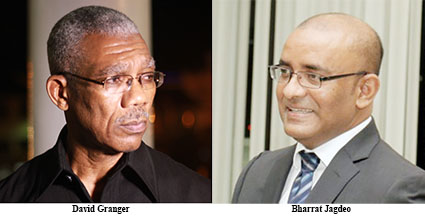Warning that the ruling by Chief Justice (Ag) Roxane George SC to uphold the appointment of Guyana Elections Commission (GECOM) Chairman Justice (retd) James Patterson could see more unilateral installments by the head of state, the People’s Progressive Party (PPP) on Friday said it would appeal the decision.
The judge’s ruling was made on an application by PPP Executive Secretary Zulfikar Mustapha, who challenged the constitutionality of the appointment, which was made by President David Granger last October.
In her ruling on Friday, Justice George, although finding that the President should have given reasons for his rejection of the nominees submitted by Opposition Leader Bharrat Jagdeo, dismissed the challenge as wholly misconceived. “I hold that there is nothing before this Court to permit a finding that the President acted unlawfully or irrationally in resorting to the proviso to Article 161(2), or to rebut the presumption that Justice Patterson is qualified to be appointed to the post of Chairman of GECOM,” she ruled.
In a brief reaction to the ruling on Friday, Justice Patterson told this newspaper that he was happy though not surprised by it.
He also noted that in theory it would allow him to function without any hindrances. “The ruling of the High Court, it’s final. So, as far as I am concerned, that issue is laid to rest. Dead. Dead. Dead. Very dead. Not to be resurrected again so we need to move forward,” he said.
However, in a statement issued after the judgment was delivered, the PPP charged that the decision strikes at the heart of the country’s constitutional and electoral democracy. “It has destroyed that delicate balance, which a Chairman is intended to bring to the Guyana Elections Commission. The framers of the Constitution intended this Chairman to be appointed through a mechanism, which involves an input from both the President and the Leader of the Opposition, to ultimately produce a person who enjoys the confidence of both. This is the reason why this Chairman is endowed with the power of a casting vote to break deadlocks at a bi-partisan Commission,” it said.
“Unfortunately, this ruling, in violation of the letter and spirit of the Constitution, seeks to legitimize a unilateral appointment of a GECOM Chairman and has crushed that crucial balance in the makeup of the Commission,” it added, while saying that a unilateral appointment is contemplated by the Constitution only in the rare and exceptional circumstance where the Leader of the Opposition fails to provide a list of nominees to the President.
The party said it will be filing an appeal to challenge the decision in its quest to secure constitutional compliance. It further said it is prepared to go all the way to the Caribbean Court of Justice if the situation so demands to reverse what it considers an erosion of the constitutional and electoral democracy. “We will expend every effort to ensure that our appeals are expeditiously heard, more particularly, at the Guyana Court of Appeal, since the decision of the Chief Justice (Ag) is already available,” it said. “It would be remiss if we do not recognise that this ruling may, or has, paved the way for more Executive unilateral appointments in situations where the Constitution require agreement between the President and Leader of the Opposition,” it added.
Following the appointment and swearing-in of the 84-year-old Patterson on October 19th last, Mustapha filed an application, contending among other things that the president had no power to make a unilateral appointment once a list of six names had been submitted to him.
He made this argument while noting that the head of state had failed to give reasons for rejecting all of Jagdeo’s 18 nominees as unacceptable.
Article 161(2) provides for the appointment of a Chairman based on a consensual process in which a list of six persons, “not unacceptable to the President,” is submitted by the Opposition Leader.
The proviso allows for the appointment to be made unilaterally, where the Opposition Leader fails to submit a list “as provided for.” Jagdeo submitted three lists, which were all rejected by Granger.
Among the issues which the court had to determine was whether the appointment of Justice Patterson was unconstitutional as the applicant contended that he had no power to make a unilateral appointment once a list of six names was submitted to him.
The court ruled that the President has the power, under Article 161(2) of the Constitution, to reject the list submitted by the Opposition Leader if it is unacceptable to him and to resort to the proviso of that article and choose a person as Chairman of GECOM who is, was, or is qualified to be appointed as a judge in Guyana or the Commonwealth.
In the circumstances, the Chief Justice ruled that the President was entitled to resort to the proviso once he found the list that was submitted to be unacceptable, but whether it was unacceptable would have depended on an objective analysis of the persons thereon according to the criteria set out by the President in a letter to Jagdeo.
The judge also found that the President is required to indicate either specifically or generally the reasons why persons on the list or the list was found by him to be unacceptable in order to justify him rejecting the entire list and resorting to the proviso.
To this prerequisite, however, the Chief Justice said, “there is nothing to suggest that this was done, nor was any submission made by the respondent to so indicate, so it must be concluded that the President has, thus far, failed to give reasons for his decision to reject the list as being unacceptable.”










